Are you considering adding a Silky Terrier to your family? If so, you have chosen a delightful little dog breed that is sure to bring you joy and companionship. Silky Terriers are small in size but big in personality, with their energetic and affectionate nature. They are known for their silky, flowing coats that require regular grooming, but their charming personalities and loyalty make up for the extra effort. In this article, we will take a closer look at the Silky Terrier breed, their characteristics, and what it takes to care for them, so you can make an informed decision about whether this breed is right for you.
Toy
Australia
23-26 cm
3-4 kg
12-15 years
High
Moderate to high
History and Origin
The Silky Terrier, also known as the Australian Silky Terrier, is a small breed of dog that originated in Australia. The breed was developed in the late 19th century by crossing the Yorkshire Terrier with the Australian Terrier. The result was a small, elegant dog with a silky coat and a lively personality.
The breed was first exhibited in Australia in 1906, and it quickly gained popularity as a companion dog. In 1926, the breed was recognized by the Australian Kennel Club, and it was later recognized by the American Kennel Club in 1955. Today, the Silky Terrier is a popular breed around the world, known for its affectionate nature and beautiful coat.
The Silky Terrier is a small dog, standing at around 9-10 inches tall and weighing between 8-10 pounds. The breed has a long, silky coat that is typically blue and tan in color. The coat is fine and glossy, and it requires regular grooming to keep it looking its best. The breed also has a small, wedge-shaped head with erect ears and dark, almond-shaped eyes.
The Silky Terrier is a lively and energetic breed, known for its playful and affectionate nature. The breed is intelligent and easy to train, and it enjoys spending time with its family. The Silky Terrier is also a good watchdog, and it will bark to alert its owners of any potential danger.
The breed is generally healthy, with a lifespan of around 12-15 years. However, like all breeds, the Silky Terrier is prone to certain health issues, including patellar luxation, Legg-Calve-Perthes disease, and dental problems. It is important to keep the breed at a healthy weight and to provide regular veterinary care to ensure its health and well-being.
In conclusion, the Silky Terrier is a small, elegant breed of dog that originated in Australia. The breed was developed by crossing the Yorkshire Terrier with the Australian Terrier, resulting in a dog with a silky coat and a lively personality. Today, the Silky Terrier is a popular breed around the world, known for its affectionate nature and beautiful coat. While the breed is generally healthy, it is important to provide regular veterinary care to ensure its health and well-being.
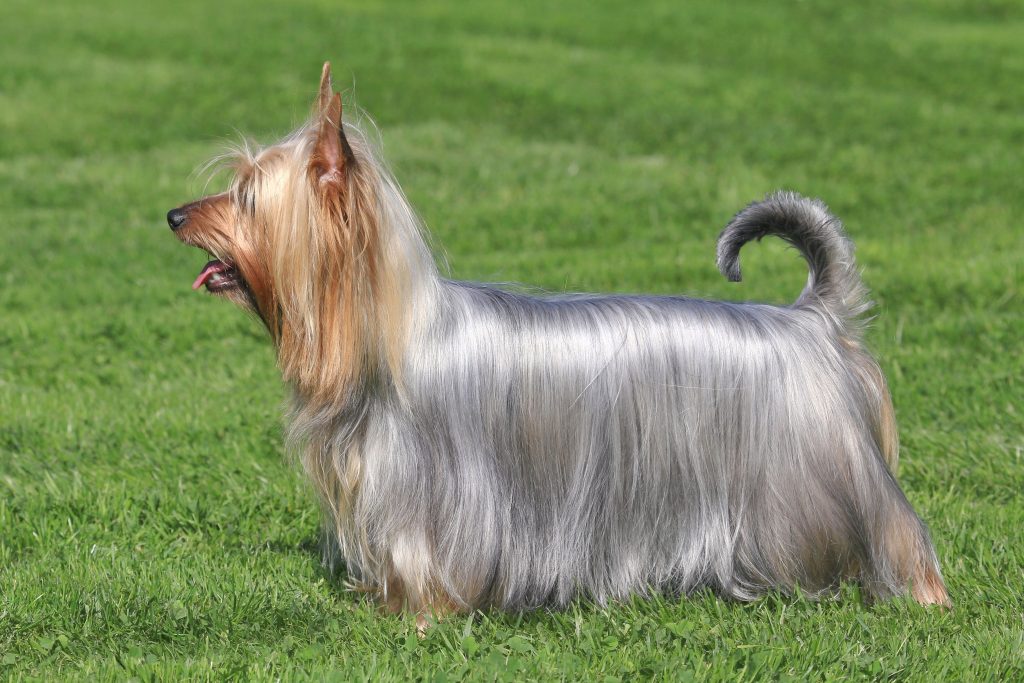
Size and Breed Category
The Silky Terrier is a small breed of dog that typically weighs between 3.5 and 4.5 kilograms. They stand at around 23 to 26 centimeters tall at the shoulder and have a compact, sturdy build. Despite their small size, they are known for their energetic and lively personalities, making them a popular choice for families and individuals alike.
As their name suggests, the Silky Terrier has a long, silky coat that requires regular grooming to keep it in good condition. Their coat is typically blue and tan in color, with a distinctive topknot of hair on their head. They are classified as a toy breed by the Kennel Club in the UK, and are known for their intelligence and loyalty to their owners. Despite their small size, they are also known for their bravery and tenacity, making them excellent watchdogs.

Fur Length and Colour
The Silky Terrier has a long and flowing coat that is soft to the touch. The fur is typically around 15 centimeters in length and falls in a straight line from the dog’s back. The fur is also quite fine and silky, which is where the breed gets its name. The fur is usually a shade of blue and tan, with the blue being the dominant color. The blue can range from a light silver-blue to a dark steel-blue, while the tan can range from a pale cream to a rich mahogany. The fur on the Silky Terrier’s face is usually shorter and finer than the rest of the body, giving the dog a distinctive look.
The Silky Terrier’s fur requires regular grooming to keep it looking its best. The fur is prone to matting and tangling, so it is important to brush it daily to prevent this from happening. The fur also sheds very little, making it a good choice for people with allergies. The breed’s fur is also quite resilient and can withstand a lot of wear and tear, making it a good choice for active families. Overall, the Silky Terrier’s fur is one of its most distinctive features and is a key part of the breed’s charm.

Termperament and Trainability
Silky Terriers are known for their lively and energetic temperament. They are highly active and require regular exercise to keep them happy and healthy. They are also very intelligent and curious, which can sometimes lead to mischief if they are not properly trained and socialized. Silky Terriers are generally friendly and affectionate with their owners, but can be wary of strangers and other dogs. They are known for their loyalty and make excellent companions for those who are willing to put in the time and effort to train and care for them.
When it comes to trainability, Silky Terriers are generally quick learners and respond well to positive reinforcement. They are eager to please their owners and enjoy learning new tricks and commands. However, they can be stubborn at times and may require a firm and consistent approach to training. It is important to start training and socializing Silky Terriers from a young age to ensure that they develop into well-behaved and well-adjusted adults. With patience and persistence, Silky Terriers can be trained to excel in a variety of activities, including obedience, agility, and even therapy work.
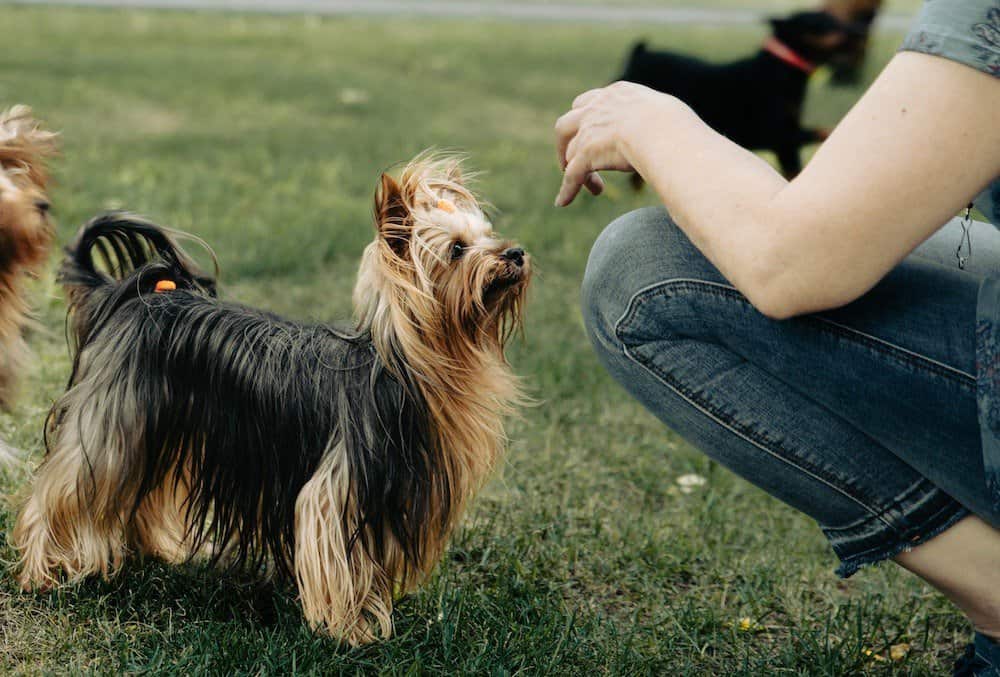
Known Health Conditions
Silky Terriers are prone to a number of health conditions, including patellar luxation, which is a condition where the kneecap dislocates from its normal position. This can cause pain and discomfort for the dog, and in severe cases, may require surgery to correct. Another common health issue in Silky Terriers is Legg-Calve-Perthes disease, which is a condition where the head of the femur bone in the hip joint deteriorates, leading to pain and limping. This condition can also require surgery to correct. Additionally, Silky Terriers may be prone to eye problems such as cataracts and progressive retinal atrophy, which can lead to blindness if left untreated.
Silky Terriers may also be at risk for developing liver shunts, which is a condition where the blood supply to the liver is abnormal, leading to a buildup of toxins in the bloodstream. Symptoms of liver shunts can include vomiting, diarrhea, and lethargy, and treatment may involve surgery to correct the abnormal blood vessels. Another health issue that Silky Terriers may face is hypothyroidism, which is a condition where the thyroid gland does not produce enough hormones. This can lead to weight gain, lethargy, and skin problems, and can be managed with medication. Finally, Silky Terriers may be prone to dental problems such as periodontal disease, which can lead to tooth loss and other health issues if left untreated. Regular dental care, including brushing and professional cleanings, can help prevent these problems.
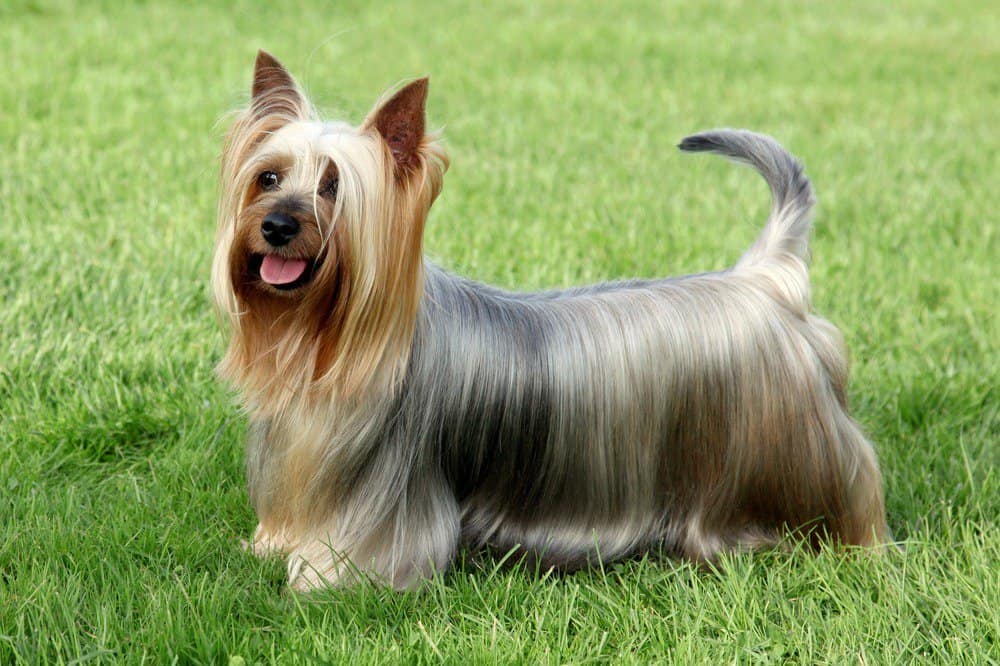
Openness to Strangers
Silky Terriers are known for their friendly and outgoing nature towards strangers. They are always eager to meet new people and make new friends. This breed is highly sociable and loves to be around people, making them great companions for families with children. They are also known to be very affectionate and loyal to their owners, often following them around the house and wanting to be involved in all family activities. Silky Terriers are not shy or timid around strangers, and will often approach them with a wagging tail and a friendly demeanor.
Despite their small size, Silky Terriers have a big personality and are not afraid to show it. They are confident and self-assured, which makes them great at meeting new people and adapting to new situations. This breed is also very intelligent and quick to learn, which makes them easy to train and teach new tricks. Silky Terriers are not aggressive towards strangers, but they will bark to alert their owners of any potential danger. Overall, this breed is very open and welcoming to strangers, making them a great choice for anyone looking for a friendly and sociable companion.
Playfulness Level
The Silky Terrier is a highly energetic and playful breed of dog. They are known for their lively and mischievous nature, which makes them a great companion for families with children. These dogs love to play and are always up for a game of fetch or tug-of-war. They are also very intelligent and enjoy learning new tricks and commands, which can help to keep them mentally stimulated and engaged. Overall, the Silky Terrier is a fun-loving and playful breed that is sure to bring joy and laughter to any household.
Despite their small size, the Silky Terrier has a big personality and a lot of energy. They are always on the go and love to explore their surroundings, which can sometimes lead to mischief and mayhem. However, with proper training and socialization, these dogs can make excellent pets for active families who are looking for a playful and loyal companion. Whether they are chasing after a ball or cuddling up on the couch, the Silky Terrier is sure to bring a smile to your face and a wag to your tail.
Suitability as a Pet for Children
Silky Terriers have a lively and affectionate personality, making them a great companion for children. They are intelligent and easy to train, which makes them an ideal pet for families with young children. Silky Terriers are also known for their loyalty and devotion to their owners, which means they will always be by your side. They are a low-shedding breed, which makes them a good choice for families with allergies. Silky Terriers are also small enough to be kept in apartments or small homes, but they still have plenty of energy to play and run around. Overall, Silky Terriers are a great choice for families looking for a loving and loyal pet that is easy to train and care for.
Exercise Needs
Silky Terriers require regular exercise to maintain their physical and mental health. They are an active breed that enjoys daily walks and playtime. A minimum of 30 minutes of exercise per day is recommended, but they will happily engage in more vigorous activities such as running, hiking, and agility training. It is important to note that they have a high prey drive and should always be kept on a leash or in a secure area to prevent them from chasing after small animals. Additionally, they thrive on mental stimulation and enjoy interactive games and training sessions with their owners.
In addition to physical exercise, Silky Terriers require regular grooming to maintain their silky coat. Brushing their coat daily will help prevent matting and tangling, and regular baths will keep their coat clean and healthy. They are also prone to dental issues, so it is important to brush their teeth regularly and provide them with dental chews or toys. Overall, providing regular exercise and grooming for a Silky Terrier will ensure they lead a happy and healthy life.
Suitability for a Multi-Pet Family
Silky Terriers have a reputation for being friendly towards other pets in the household. They are known to get along well with cats and other dogs, as long as they are socialized properly from a young age. It is important to supervise interactions between pets to ensure that they are safe and comfortable with each other. Silky Terriers may display some territorial behavior, but this can be managed with training and positive reinforcement. Overall, Silky Terriers can make great companions for other pets in the household.
Housing Requirements
Silky Terriers require a living space that is comfortable and safe. They need a warm and dry environment that is free from drafts and extreme temperatures. The ideal temperature range for a Silky Terrier is between 18-22°C. They also require a space that is well-ventilated to prevent the buildup of harmful gases. The living space should be free from any hazardous materials or objects that could harm the dog. Silky Terriers are active dogs and require regular exercise, so a living space with access to a secure outdoor area is ideal.
Silky Terriers require a comfortable sleeping area that is quiet and free from distractions. They prefer a soft and warm bed that is elevated off the ground. The sleeping area should be located in a quiet part of the house, away from any noise or activity. Silky Terriers are social dogs and enjoy spending time with their owners, so it is important that their sleeping area is located in a part of the house where they can be close to their owners. They also require access to fresh water at all times, so a water bowl should be located near their sleeping area.
Summary
Silky Terriers make great pets for those who are looking for a loyal and affectionate companion. They are known for their playful and energetic nature, making them a great choice for families with children or active individuals. They are also highly intelligent and trainable, making them a good fit for those who enjoy teaching their pets new tricks. Additionally, their small size makes them suitable for apartment living or for those with limited outdoor space. Overall, Silky Terriers are a great choice for those looking for a loving and lively pet.
Silky Terrier Dog FAQS
Yes, Silky Terriers are intelligent and eager to please, making them easy to train with positive reinforcement techniques.
Yes, Silky Terriers are good with children and make great family pets.
Yes, Silky Terriers are hypoallergenic and are a good choice for people with allergies.
Silky Terriers are prone to certain health issues such as patellar luxation and Legg-Calve-Perthes disease.
No, Silky Terriers do not shed a lot and are considered a low-shedding breed.
Silky Terriers usually live for 12 to 15 years.
Silky Terriers need at least 30 minutes of exercise daily to stay healthy and happy.
Silky Terriers should be groomed at least once a week to keep their coat healthy and tangle-free.
Silky Terriers usually grow up to 23 to 25 centimeters in height.
The average weight of a Silky Terrier is between 3.5 to 4.5 kilograms.
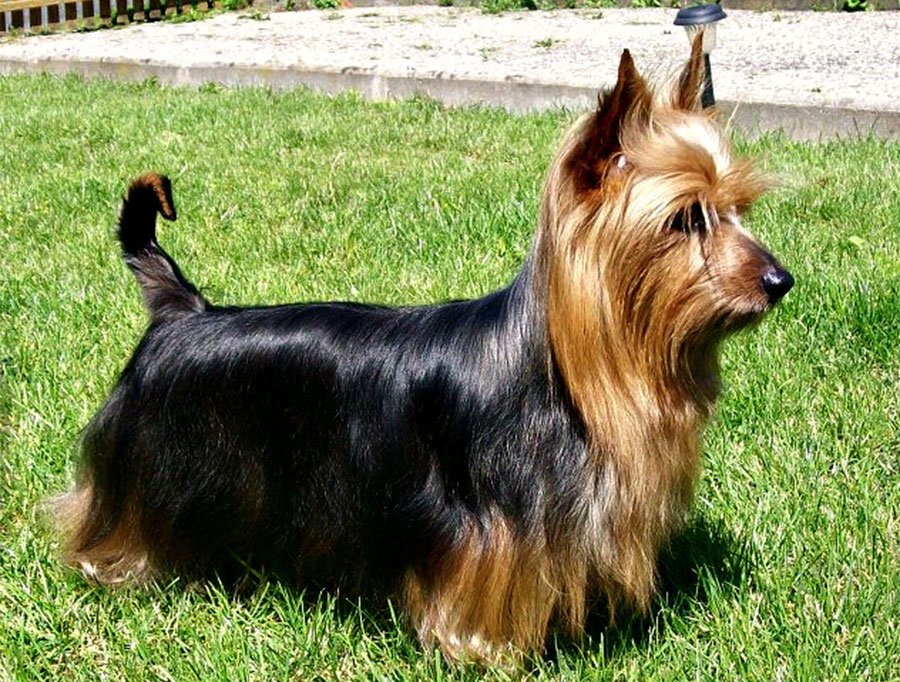
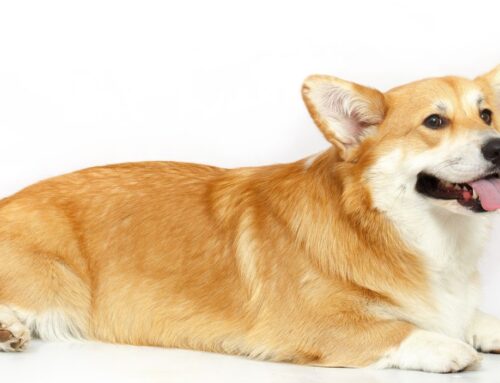
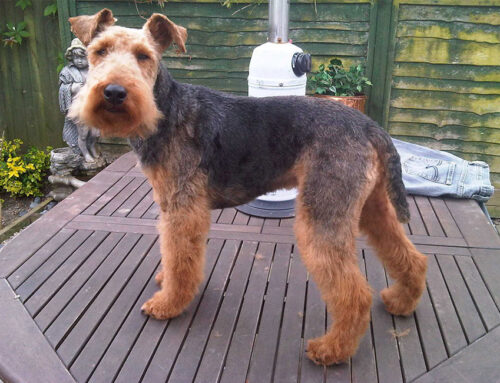

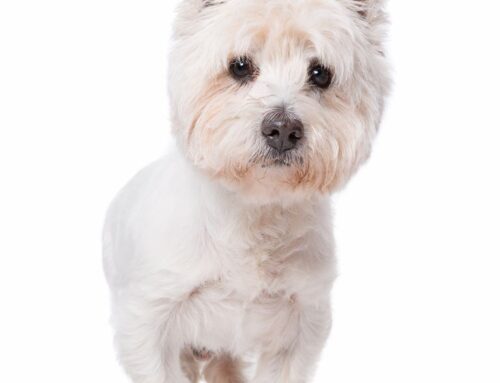
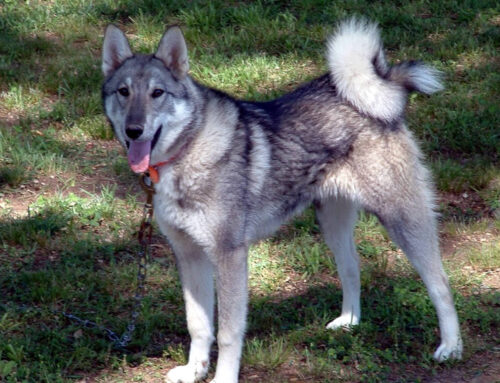
Leave A Comment